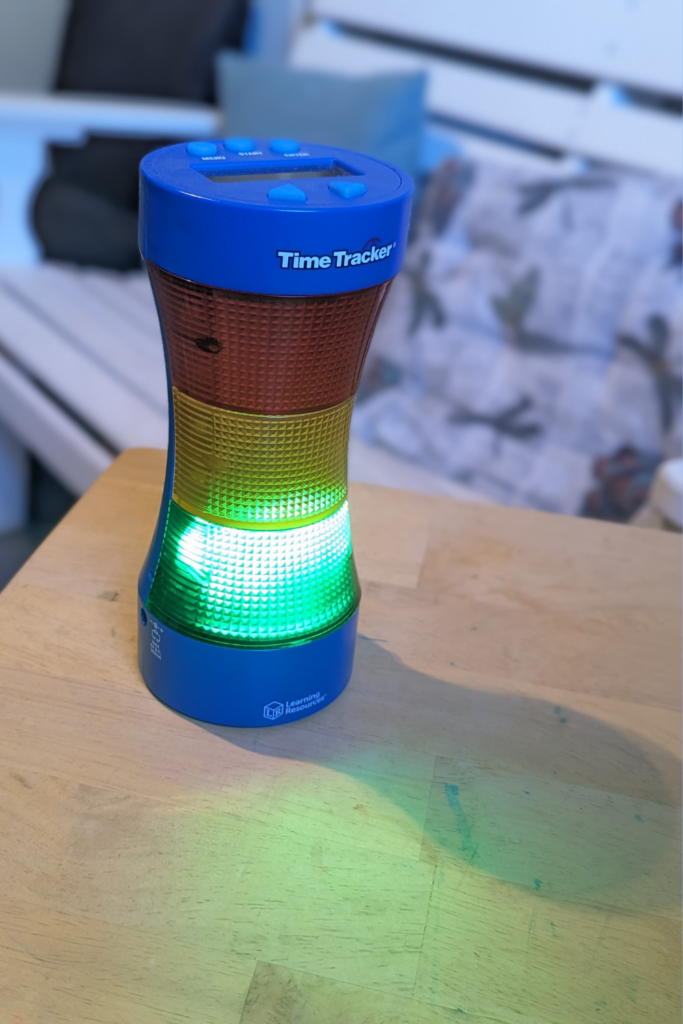
Time Blindness refers to difficulty guessing how much time has passed or remembering when an event occurred. Time blindness is an unofficial symptom that is often common in people with ADHD and/or Autism, both of which are neurodevelopmental disorders.
People with time blindness often have trouble:
- Accurately evaluating how long a task will take them.
- Knowing how long has passed when they’re doing a task.
This causes problems in how we manage our time.
We are often chronically late to scheduled events- or alternatively, we have a lot of anxiety about arriving to events on time and may even be chronically early, or have intricate ways to manage our time that others don’t need to do. For example, setting 12 different alarms at different times so we don’t miss our plane.
We may have difficulty staying organized about our plans for the day, particularly when we’re in an environment that doesn’t provide a regimented scheduled for us (such as when we are in grade school or the military). While regimented schedules can be really helpful for us, it’s better for people with time blindness to learn how to manage this symptom ourselves.
Hacks for Time Blindness
Here’s the deal- you’ll likely always be time blind. You just can learn to cope with it better.
Use Technology
You have a lot of technology at your fingertips. There are lights that turn down or up at certain times to help get you ready to wake up or go to bed. There are devices like Alexa that can let you know about upcoming events or give you a timer. Use these resources.
I also try to give tasks that are hard for me to those devices. I bought a 2-pack of outdoor timers for my electric fence for $40 or so. It will turn my electric fence on EVERY day at 7pm if I forget. This prevents any predators from getting my animals at night and it relieves a lot of anxiety around having the executive functioning to remember this task every day.
Use your alarms. My phone is always on me… so is my watch. I setup alarms and calendar notifications to keep myself on task. This is the ONLY REASON I am not late everywhere. If I forget to write down something that I scheduled, I WILL NOT REMEMBER to do it later. I need to sit there and add it to my calendar immediately.
I LOVE that many scheduling programs now give you the option to click to add to your Google calendar. This saves me time and it makes it less likely that I’ll start entering an event and forget to finish… it’s an AMAZING tool.
Visual Timers
Visual timers are a good option for people with time blindness. We need to SEE the time passing. As an example, I didn’t have a watch in elementary school, but I would often do homework on the bus ride home. I could ‘see’ the time passing because I knew how many stops existed before I got home.
But there are a lot of great tools for people with time blindness now. You can use the old fashioned hour glass, or get one of the fancy countdown timers that changes color. The timer below is green for most of the time, but changes yellow, then red when you’re running out of time.

There are also quite a few apps that you can use to do the same thing. Focus Plus is a timer app that is intended to help you focus for a portion of time. You can use the timer that comes free on your phone as well, although it’s important to either set multiple alarms (one that goes off 5-10 minutes before your time ends) so you don’t get shocked by the sudden timer going off. It can be VERY aggravating to be hyper focused on something and think you have a lot of time left, just to be surprised by a blaring alarm.
This can be QUITE jarring for time blind children, particularly when they’re doing a task they enjoy. That 30 minute timer takes FOREVER when they’re doing homework, but it’s WAY too quick when they’re playing video games. Having a warning can be helpful to avoid anger and frustration. I talk about this in my post about Countdowns for Parenting.
Writing Tasks Down and Prioritizing
One way to skill to practice is making a list of all the tasks that you need to complete, then prioritizing each item on the list. Redo the list with the priority items first.
This is extremely helpful because we often know we have this huge list of tasks and our main struggle is figuring out how to prioritize them. I had to prep for a storm the other day, had a mental list of tasks, and ended up prioritizing them wrong because I didn’t do this first. I wasted a lot of time and ended up out in the dark trying to finish things off before the storm hit. Whoops. I quickly realized that I could have avoided this whole issue if I’d taken 5 minutes to make and prioritize the task list that morning.
The other thing that can happen when we have a lot to do is that we end up in the ‘deer in headlights’ mode and don’t get anything done… it’s this sense that we don’t know where to start and it all feels too big. Being able to make that list ahead of time can help. When I’m ‘stuck,’ I try to add an easy and quick task to the beginning of the list, even if it isn’t as high priority.
Working Backwards
This is going to be the hardest part- you need to make a list of your tasks and how much time each will take you. BE REALISTIC and realllllly check yourself. It might be worth asking someone else how long they think it will take. I tend to think some tasks are quick that just AREN’T. “I’ll just put up the rest of the electric fencing quickly.” Fencing is never quick. Never. So writing down 15 minutes isn’t realistic. If I write down 60 minutes and I get it done faster, that’s fine. But it’s better to plan for it to take longer than expected- especially when you’re prone to forgetting supplies and needing to make several trips back to the house to get what you need.
Once you know how long each task will take, make a schedule of your day with the end time being any scheduled event- ie. needing to leave for work or to get on a plane, etc. If your whole day is free, make the end time the time that you need to eat dinner. Then work backwards and figure out how to put all of those items on the schedule, with the less high priority items towards the end of the day. That thing you MUST DO (ie. cash your paycheck before you overdraw your bank account) needs to be FIRST.
Remembering Time in Relation to Other Events
It’s very difficult for people with time blindness to remember when events occurred. This is a HUGE issue in classes like history when regurgitating the year something happened is part of exams. One way to cope with this is to draw out timelines to see the visual depiction of when things occurred. This is particularly helpful if you can have other events of reference on that timeline. It may still be difficult to remember the exact date, but it helps you make a better educated guess for multiple choice questions.
As an example, many adults in my generation have distinct memories of 9/11 and they may be able to remember historical moments around that- for example, I struggle to remember who was president when, but I DISTINCTLY remember George Bush Jr. being told about 9/11 while reading to a bunch of elementary students. I know that rules regarding planes changed after 9/11. I can often work back in terms of remembering other events in respect to that event. “Hmm when did I go on that trip? Ahh I remember we had friends who met us at the gate so it must have been pre-9/11.”
For personal events, you can divide time periods of your life into segments. For example, many of us now have “pre pandemic” and “post pandemic” as two segments of our life. I can tell you if an event happened before the pandemic or after. I might need to think through it a bit, but I can usually get there fairly quickly. Similarly, I have segments such as “before/after kids,” “before/after my move to Maryland,” “elementary school vs middle school.”
While the concept of time blindness is relatively ‘new’ in terms of people actually talking about it, it’s always been an issue for many people. It’s really helpful to know what it is and to understand ways to balance it. It’s also helpful to know that your child isn’t necessarily throwing a tantrum about being told to get off video games, but rather that they’re struggling with the abrupt change due to time blindness. It doesn’t mean that they get extra video game time, but perhaps you start setting up a visual timer to help them be less startled or frustrated when the time is up. They can prepare for the transition and save their game.
Hope this helps!


